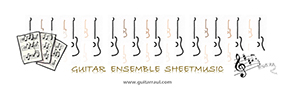Nicholas Galfond
In the first few decades of the seventeenth century countless songbooks were published in Italy, more than 300 of which included the notation system for guitar accompaniment known as alfabeto. This early repertoire for the five-course Spanish guitar was printed mostly in Naples, Rome, and Florence, and was a pivotal precursor to our modern tonal musical understanding. The very nature of both the instrument and its characteristic dance-song accompaniment style led composers to create block harmonies in diatonic progressions long before such concepts bore any semblance to a functioning theory.
This paper uses the 1620 publication Arie a una voce by Roman composer Stefano Landi as a case study through which to examine the important roles that both alfabeto and the guitar played in the development of monody. The ongoing debates over the practicality, authorship, and interpretation of alfabeto notation are all addressed in reference to the six pieces marked “per la chitara Spag.” found near the end of Landi’s first songbook. This will provide an understanding of the alfabeto notation system as well as the role of the guitar in the rise of monody, provide more specific answers concerning the viability of accompanying these specific songs on the guitar, and provide a means for constructing an informed interpretation and recording of these examples of a long-overlooked repertoire.





